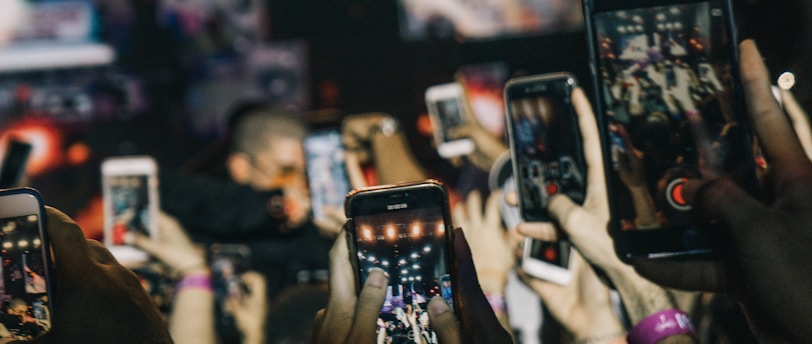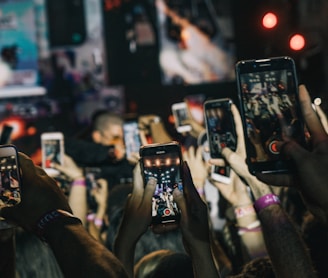Unveiling the Dark Side: Exploring the Negative Impact of Social Media
"Unveiling the Dark Side: Exploring the Negative Impact of Social Media" is an eye-opening guide that empowers readers to critically examine their own relationship with social media and make informed decisions about their online presence. Together, let's navigate the complex landscape of social media and discover how we can reclaim control over our digital lives for a healthier and happier future.
HEALTH
Positive Thinker
6/17/20236 min read


Unveiling the Dark Side: Exploring the Negative Impact of Social Median a world that thrives on connectivity and digital interaction, it's crucial to delve into the often-overlooked consequences of our hyper connected society. In our blog, "Unveiling the Dark Side: Exploring the Negative Impact of Social Media," we shine a light on the hidden perils that lie beneath the surface of our favourite online platforms.
Join us as we embark on a journey through the treacherous terrain of social media, where we uncover the detrimental effects that can wreak havoc on our mental, emotional, and even physical well-being. From the seemingly harmless habit of scrolling to the insidious impact of comparison and self-esteem issues, we dissect the various ways in which social media can leave a lasting negative imprint.
Through thought-provoking analysis and real-life stories, we dismantle the myth that social media is always a force for good. We discuss the rise of cyberbullying, the invasion of privacy, and the addictive nature of these platforms, which often trap us in a cycle of seeking validation and approval.
However, our exploration is not solely focused on doom and gloom. Along the way, we also delve into strategies and solutions to mitigate the negative impact of social media. We highlight the importance of digital well-being, mindful usage, and finding a healthy balance between the online and offline worlds.
"Unveiling the Dark Side: Exploring the Negative Impact of Social Media" is an eye-opening guide that empowers readers to critically examine their own relationship with social media and make informed decisions about their online presence. Together, let's navigate the complex landscape of social media and discover how we can reclaim control over our digital lives for a healthier and happier future.
In today's digital age, social media has become an integral part of our lives. It has revolutionized the way we connect, communicate, and consume information. Platforms like Facebook, Instagram, Twitter, and TikTok have transformed the way we interact with one another and the world around us. However, beneath the surface of this seemingly innocuous virtual realm lies a dark side that often goes unnoticed. In this article, we delve deep into the negative impact of social media, unmasking its detrimental effects on our mental health, relationships, and society as a whole.
The Illusion of Connection
One of the most striking aspects of social media is its ability to create an illusion of connection. With just a few taps on a screen, we can instantly reach out to hundreds or even thousands of people. However, this form of connection is often superficial and lacking in genuine depth. Studies have shown that excessive use of social media can lead to feelings of loneliness, as we are bombarded with carefully curated images of others' seemingly perfect lives. The constant comparison to highlight reels and the fear of missing out (FOMO) can contribute to a sense of inadequacy and isolation.
The Perils of Cyberbullying
While social media offers a platform for self-expression and connection, it also provides fertile ground for cyberbullying. Behind the anonymity of a screen, individuals may feel emboldened to engage in hurtful behavior, targeting others with online harassment, threats, or the spreading of false information. The consequences of cyberbullying can be severe, leading to profound emotional distress, depression, and even suicide in extreme cases. The pervasive nature of social media amplifies the reach and impact of such bullying, making it difficult for victims to escape its clutches.
The Impact on Mental Health
Numerous studies have established a strong correlation between social media usage and poor mental health outcomes. The constant exposure to carefully curated portrayals of others' lives can contribute to feelings of anxiety, depression, and low self-esteem. The pressure to conform to societal expectations, coupled with the relentless pursuit of validation through likes and followers, can lead to a distorted sense of self-worth. Furthermore, the addictive nature of social media, with its infinite scrolling and constant notifications, can disrupt sleep patterns and exacerbate feelings of stress and overwhelm.
The Erosion of Privacy
Privacy, once considered a fundamental right, is increasingly compromised in the age of social media. Users willingly share personal information, often unaware of the potential consequences. Social media platforms collect and store vast amounts of data, which can be exploited for targeted advertising, manipulation, and even surveillance. The erosion of privacy not only puts individuals at risk but also raises concerns about the broader implications for democracy, civil liberties, and societal trust.
Fake News and Echo Chambers
Social media has become a breeding ground for the spread of misinformation and the formation of echo chambers. Algorithms designed to personalize our feeds based on our interests and preferences inadvertently create echo chambers, reinforcing our existing beliefs and limiting exposure to diverse perspectives. This polarization of information can lead to the dissemination of fake news, conspiracy theories, and the erosion of public discourse. The consequences are far-reaching, undermining the foundation of informed decision-making and fostering a climate of mistrust and division.
Addressing the Dark Side
While the negative impact of social media is evident, it is crucial to recognize that it is not inherently evil. Social media platforms can be powerful tools for positive change, activism, and community building. The key lies in addressing the dark side and harnessing the potential for good. Here are some strategies to mitigate the negative impact of social media:
Mindful Usage: Becoming conscious of our social media habits and setting healthy boundaries is essential. Allocating specific time slots for social media engagement, limiting screen time, and practicing digital detoxes can help restore balance and reduce the negative effects.
Digital Well-being: Prioritizing self-care in the digital realm is crucial. Engaging in activities that nourish our mental and emotional well-being, such as practicing mindfulness, exercising, and engaging in offline hobbies, can counteract the negative impact of social media.
Critical Thinking: Developing critical thinking skills is paramount in navigating the online landscape. Encouraging media literacy, fact-checking information before sharing, and seeking diverse perspectives can help combat the spread of misinformation and broaden our understanding.
Fostering Authentic Connections: Investing time and effort in cultivating real-life relationships and meaningful connections can counteract the feelings of loneliness and inadequacy induced by social media. Prioritizing face-to-face interactions and deepening offline connections can contribute to our overall well-being.
Social media, with its undeniable power and influence, has a dark side that demands our attention. From the illusory nature of connection to the detrimental impact on mental health, relationships, and privacy, the negative effects of social media are far-reaching. However, by understanding these consequences and adopting mindful practices, we can navigate the virtual realm more consciously. It is within our power to harness the positive aspects of social media while mitigating its dark side. Let us strive for a digital landscape that fosters genuine connections, empowers critical thinking, and protects our collective well-being.
Frequently Asked Questions:
Q1: What are some of the negative impacts of social media on mental health?
A1: Social media can contribute to feelings of loneliness, anxiety, and depression. The constant exposure to curated portrayals of others' lives, along with the pressure to seek validation through likes and followers, can lead to low self-esteem and a distorted sense of self-worth. Additionally, the addictive nature of social media and the fear of missing out (FOMO) can disrupt sleep patterns and increase stress levels.
Q2: How does social media contribute to cyber bullying?
A2: Social media provides a platform for anonymous individuals to engage in cyber bullying, targeting others with online harassment, threats, or spreading false information. The relative anonymity and reach of social media amplify the impact of cyber bullying, leading to emotional distress, depression, and even suicide in severe cases.
Q3: What are the implications of the erosion of privacy on social media?
A3: The erosion of privacy on social media raises concerns about personal data security and potential exploitation. Social media platforms collect and store vast amounts of data, which can be used for targeted advertising, manipulation, and surveillance. This compromises individual privacy rights and raises broader questions about democracy, civil liberties, and societal trust.
Q4: How does social media contribute to the spread of fake news and the formation of echo chambers?
A4: Social media algorithms personalize content based on users' interests and preferences, creating echo chambers where individuals are primarily exposed to information that reinforces their existing beliefs. This can lead to the spread of misinformation, fake news, and the polarization of information. The consequences include the erosion of informed decision-making and the fostering of division and mistrust in society.
Q5: How can we mitigate the negative impact of social media?
A5: Mitigating the negative impact of social media involves adopting mindful usage practices, setting boundaries on screen time, and practicing digital detoxes. Prioritizing digital well-being through self-care activities, such as mindfulness and offline hobbies, can also help. Developing critical thinking skills, fact-checking information before sharing, and seeking diverse perspectives are crucial in combating the spread of misinformation. Additionally, fostering authentic connections in real life and prioritizing face-to-face interactions can counteract the feelings of loneliness and inadequacy induced by social media.
